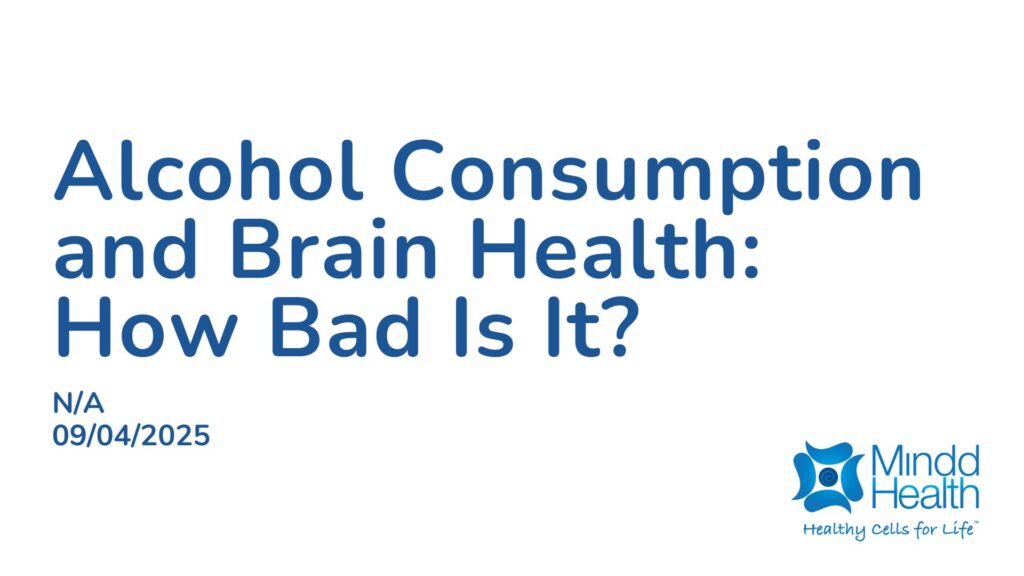Summary:
This study aimed to understand how drinking alcohol, especially heavy drinking, affects the brain as we age. It is well known that alcohol consumption is linked with health concerns, in particular many types of cancers, but its long-term effects on brain changes linked to dementia and memory loss are not fully clear. The researchers looked at brain samples from autopsies and classified them based on their drinking habits: never drank, moderate drinkers, heavy drinkers, and former heavy drinkers. They examined different signs of brain damage, such as plaques and tangles related to Alzheimer’s disease, other types of brain changes, and blood vessel problems in the brain. They also measured the cognitive health of the participants before they died and compared this to their brain health and drinking history. The study included 1,781 people. It found that moderate, heavy, and former heavy drinkers had more blood vessel damage in the brain, called hyaline arteriolosclerosis. Heavy and former heavy drinkers also showed more signs of brain changes related to Alzheimer’s disease. Those who used to drink heavily had smaller brains relative to their height and performed worse on thinking tests. Importantly, the link between drinking and poorer brain health and cognitive abilities was explained by the blood vessel damage in the brain. In summary, drinking alcohol, especially heavily, is connected to brain changes and blood vessel damage that can reduce brain size and worsen brain health in older adults, increasing risk of disease.
Abstract:
Background and Objectives: Heavy alcohol consumption is a major global health concern linked to increased morbidity and mortality. However, the long-term impact of excessive alcohol consumption on cognitive abilities and dementia-related neuropathology is unclear. The aim of this study was to analyze the association between alcohol consumption and age-related neuropathologic outcomes in a population-based autopsy study. Methods: This cross-sectional study used data from the Biobank for Aging Studies, classifying participants as never, moderate, heavy, or former drinkers. Alzheimer disease pathology (neuritic plaques, amyloid deposition, and neurofibrillary tangles), Lewy body pathology, transactive DNA-binding protein 43, lacunar infarcts, hyaline arteriolosclerosis, and cerebral amyloid angiopathy were evaluated following international criteria using immunohistochemistry and hematoxylin and eosin staining. Cognitive abilities were evaluated using the Clinical Dementia Rating Scale Sum of Boxes, and the brain mass ratio was calculated by dividing the brain weight by the participant’s height. Logistic and linear regression models were used to investigate the associations between alcohol consumption and neuropathology while we used mediation analysis to evaluate the direct and indirect effects of alcohol on cognition through neuropathologic lesions. Results: We included 1,781 participants (mean age 74.9 ± 12.5 years, mean education 4.8 ± 4.0 years, 49.6% women, and 64.1% White). Compared with participants who never consumed alcohol, moderate (odds ratio [OR] 1.60, 95% CI 1.19–2.15, p = 0.001), heavy (OR 2.33, 95% CI 1.50–3.63, p < 0.001), and former heavy (OR 1.89, 95% CI 1.41–2.54, p < 0.001) alcohol consumptions were associated with hyaline arteriolosclerosis while only heavy (OR 1.41, 95% CI 1.10–2.30, p = 0.012) and former heavy (OR 1.31, 95% CI 1.02–1.68, p = 0.029) alcohol consumptions were associated with neurofibrillary tangles. Former heavy drinking was associated with a lower brain mass ratio (β −4.45, 95% CI −8.55 to −0.35, p = 0.033) and worse cognitive abilities (β 1.31, 95% CI 0.54–2.09, p < 0.001). The association between impaired cognitive abilities and alcohol consumption was fully mediated by hyaline arteriolosclerosis (β 0.13, 95% CI 0.02–0.22, p = 0.012). Discussion: Moderate, heavy, and former heavy alcohol consumptions were associated with hyaline arteriolosclerosis and neurofibrillary tangles. Former heavy alcohol consumption was associated with reduced brain mass and cognitive abilities. The association between alcohol and cognitive abilities was fully mediated by hyaline arteriolosclerosis. The lack of longitudinal data on alcohol consumption duration restricts the interpretation of our findings.
Article Publication Date: 09/04/2025
DOI: N/A



